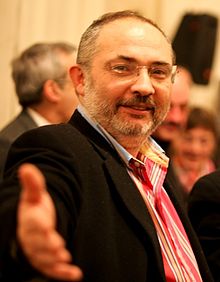Marat Alexandrovich Gelman
Marat Alexandrowitsch Gelman ( Russian Марат Александрович Гельман , also known under the transcription Marat Guelman ; born December 24, 1960 in Chișinău , Moldovan SSR ) is a Russian gallery owner.
Gelman was born in Chișinău, his father is the playwright Alexander Gelman . He studied in Moscow at the Electrotechnical Institute for Telecommunications , after completing his studies in 1983 he went back to Chișinău and worked there as a laboratory manager and engineer. Already at this time he began collecting art and organized private exhibitions. In 1990 Gelman returned to Moscow, where he founded the first private gallery for contemporary art in the Soviet Union and in Russia.
Together with Gleb Pawlowski , Gelman founded the organization Фонд эффективной политики (Foundation for Effective Politics) in 1995, which called itself the "Institute for Public Opinion Research and Election Management". The foundation was instrumental in the development and implementation of various election campaigns in Russia. A large part of the victory of Boris Yeltsin in the presidential election campaign in 1996 is attributed to your work and the foundation is said to have made a decisive contribution to the victory of Vladimir Putin in the presidential elections in 2000; the establishment of the short-lived left-wing nationalist Rodina party is also said to be the result of an initiative of this organization. In 2002 Gelman retired from politics and held a leading position at the state television broadcaster Perwy kanal until 2004 , after which he concentrated mainly on his work as a gallery owner and art dealer, with his gallery being one of the most well-known for contemporary art in Russia. Gelman also ran a gallery in the Ukrainian capital Kiev from 2001 to 2004 .
In his Moscow gallery, Gelman has also exhibited works by controversial action artists such as Oleg Kulik or Alexander Brener or the group " The Blue Noses " or given these artists space for their actions. In October 2006 masked men broke into the gallery and destroyed the works of the artist Alexander Dschikija exhibited there . Gelman was injured in this attack.
Gelman’s person and his work are perceived contradictingly and assessed differently in Russia. On the one hand, he participates in government-initiated projects such as the Skolkowo Innovation Center . On the other hand, he has repeatedly criticized the policy of the Russian government, for example in connection with the criminal case against the band Pussy Riot . At times he was a member of the Social Chamber of Russia , after public criticism of Russian cultural policy, he was no longer nominated for membership in this chamber. From 2008 to June 2013 Gelman headed the Museum of Contemporary Art (Музей современного искусства) PERMM in the city of Perm . The works of art exhibited there, and in particular the sculptures displayed in the public space of the city, led to controversial debates, and after a number of controversial exhibitions Gelman was dismissed as director of the museum in June 2013.
On December 30, 2021, Gelman was added to the list of " foreign agents ".
Web links
- Gelmans Gallery website
- Website of the PERMM museum
- Marat Gelman's blog
- Website of the Gelmans Gallery in Kiev
- The Tsar of the Moscow Scene , article on Gelman in Stern, March 2007
Individual evidence
- ↑ The Tsar of the Moscow Scene , art - Das Kunstmagazin March 2007 ( page no longer available , search in web archives ) Info: The link was automatically marked as defective. Please check the link according to the instructions and then remove this notice.
- ^ Homepage of the Skolkowo Innovation Center
- ↑ Article at lenta.ru, September 2011
- ↑ That's not Russian, get rid of it! Article from Die Zeit on June 28, 2012
- ^ No space for critical art in Perm , report on Deutschlandfunk from June 20, 2013
- ↑ Moscow classifies pussy riot activists as "foreign agents". Der Standard , December 30, 2021, accessed the same day.
| personal data | |
|---|---|
| SURNAME | Gelman, Marat Alexandrovich |
| ALTERNATIVE NAMES | Гельман, Марат Александрович (Russian spelling) |
| BRIEF DESCRIPTION | Russian gallery owner |
| BIRTH DATE | December 24, 1960 |
| PLACE OF BIRTH | Chișinău |
